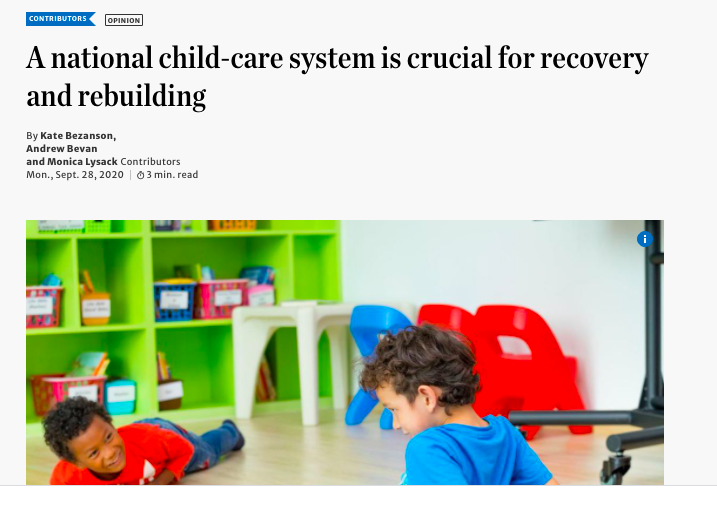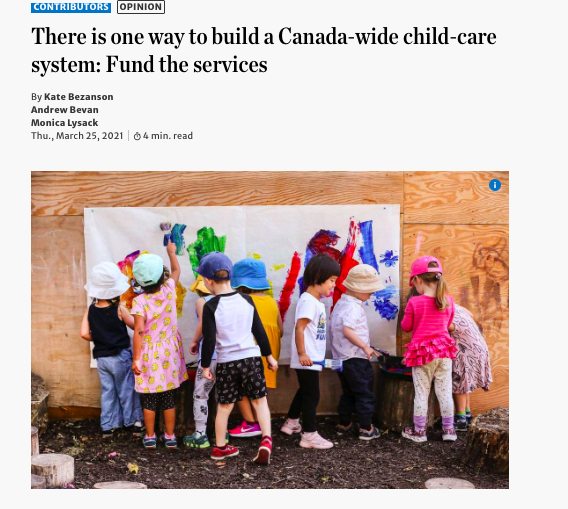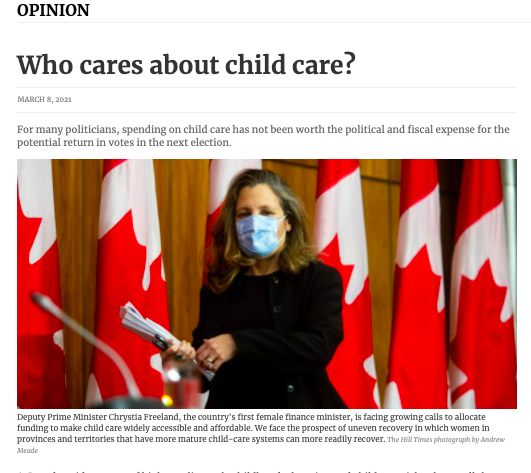
Media

Reigniting the Economy through Childcare
TVO The Agenda, September 14, 2020Television
URL: https://www.tvo.org/video/reigniting-the-economy-through-childcare
Niagara in the Morning, 610 CKTB, March 3, 2021Radio/Podcast
Niagara in the Morning, 610 CKTB, “Child Care in Canada – what’s the best approach?” 3 March 2021. Online: https://www.iheartradio.ca/610cktb/audio/child-care-in-canada-what-s-the-best-approach-1.14693676?mode=Article
CKTB 610, April 22, 2020Radio/Podcast
Immediate financial support of the child-care sector will be a key factor in Canada’s recovery from the COVID-19 pandemic, says a Brock University Sociology professor.
Associate Professor Kate Bezanson, an expert in social policy and political economy, says as the federal government continues to manage the immediate health, social and economic challenges of COVID-19, it also needs to support child-care services if it wants to see a lasting recovery from the pandemic.
“In the short term, if regulated child-care centres don’t have targeted supports now to meet their operating costs, many of them will fold,” Bezanson says. “If that happens, when the crisis ends, we will have very limited capacity for those working at home now to return to the labour market.”
Bezanson recently joined Andrew Bevan, a former Chief of Staff to a Premier of Ontario and a federal Leader of the Opposition, as well as Sheridan College Early Childhood Education Professor Monica Lysack in authoring a policy report titled “From stabilization to stimulus and beyond: A roadmap to social and economic recovery.”
A summary of the paper was published recently in First Policy Response, and the trio have also written an opinion column about the issue which is expected to be published this week.
The policy paper identifies key elements that Bezanson and her co-authors believe should inform government decisions around stabilization, stimulus and recovery periods including: fostering social solidarity; placing care at the core of policy decisions; encouraging collaborative federalism and federal leadership; and centrally, investing in social infrastructure with child care as a building block as a key recovery tool.
“The monumental challenge posed by the COVID-19 crisis requires us to react in real time, but also to plan now to build the infrastructure we’re going to need so that its available to move to recovery and allow us to come out the other side,” she says. “This means learning from the mistakes of past economic crises, and investing in social and not just built infrastructure in order to stimulate both women’s and men’s employment.”
Bezanson says that the initial impacts of COVID-19 pandemic have been gendered.
“Stats Can data from March found that a disproportionate share of those who were laid off or had hours significantly reduced were women,” she says. “For women still working — primarily from home — many are having to balance paid work demands with taking care of children.
“Women have additionally borne this crisis with particular severity as they are the majority of essential front-line health care and social service workers.”
Bezanson says it will be crucial that the care sector — and especially regulated child care — be at the core of the recovery phase of dealing with the crisis.
“The result of that not happening is you will have parents struggling to find care at a time when they are eager to return to work,” she says. “This, in turn, would stunt the speed of the economic recovery.”
Bezanson and her co-authors argue that the federal government should also create the promised Childcare Secretariat office, which would become the “clearinghouse for efforts to support, shore up and build a much-needed child-care system,” they write. “This will result in the creation of new jobs within the system — and draw more women into the labour market, essential to a strong sustainable recovery.”

A National Child-care System is Crucial for Recovery and Rebuilding
Toronto Star, September 28, 2020Print
Bezanson, K., A. Bevan, and M. Lysack (2020) A National Child-care System is Crucial for Recovery and Rebuilding. Toronto Star, 28 September, 2020. Online: https://www.thestar.com/opinion/contributors/2020/09/28/a-national-childcare-system-is-crucial-for-recovery-and-rebuilding.html

There is One Way to Build a Canada-Wide Child-care System: Fund the Services
Hamilton Spectator, March 25, 2021Print
Bezanson, K., A. Bevan and M. Lysack (2021) There is One Way to Build a Canada-Wide Child-care System: Fund the Services. Hamilton Spectator, March 25, 2021. Online: https://www.thespec.com/opinion/contributors/2021/03/25/there-is-one-way-to-build-a-canada-wide-child-care-system-fund-the-services.html

Who Cares about Child Care?
The Hill Times, March 8, 2021Online
URL: https://www.hilltimes.com/2021/03/08/who-cares-about-child-care/287326
Kaplan, S. and K. Bezanson (2021) Who Cares about Child Care? The Hill Times, March 8, 2021. Online: https://www.hilltimes.com/2021/03/08/who-cares-about-child-care/287326
Canada Needs a Childcare System for Recovery and Beyond: The Future of our Labour Force Rests on Building Accessible, Affordable Childcare
First Policy Response, June 18, 2020Online
URL: http://policyresponse.ca/canada-needs-a-childcare-system-for-recovery-and-beyond/
Childcare is key to Canada’s capacity to reopen and rebuild from the COVID-19 crisis. When the COVID-19 crisis hit, women were the first called or pushed out of the labour market, making this Canada’s first care- and service-sector led recession – what some call a ‘pink collar recession’ or ‘she-cession.’ Without immediate investments as well as planning for childcare system building, women will be both the first out and last back. Such an outcome will yield massive consequences at the household and macroeconomic levels, including stalled economic growth, decreased taxation revenues for governments, and increased poverty for women and children. As provinces and territories emerge from lockdown, new childcare challenges compound pre-existing ones. Federal leadership is urgently required both to stabilize existing childcare and to build toward a childcare system. Redressing patchwork accessibility, uneven affordability, and variable quality will generate and sustain economic recovery. It will stimulate employment in built infrastructure spending (such as in centre construction and retrofitting), and in social infrastructure spending (such as employment in the childcare sector as well as women’s ability to rejoin/join the labour market). Building a childcare system will protect Canada’s economy against the care vulnerabilities revealed by the pandemic.
Five steps should be immediately taken:
(1) Restore pre-COVID capacity via investments in necessary operational, safety, wage, and staff funding for regulated spaces;
(2) Restoring capacity must involve building satellite-to-permanent spaces via investments in alternate additional sites to provide safe delivery with reduced ratios, and begin repurposing these for long-term system expansion;
(3) Employ flexible, safe, and smart improvisation for summer 2020 via assistance for summer (July and August) programming for school aged regulated childcare and camp programs;
(4) Plan school to care coordination that expands childcare capacity to full days for school aged children where full time school attendance is unavailable due to physical distancing requirements; and
(5) Immediately appoint and deploy the federal Childcare Secretariat to develop, collaborate, and build toward a national system of childcare for all Canadian children that need it.
Part of Canada's recovery must be an overdue plan for universal childcare
Hamilton Spectator, May 1, 2020Online
Even as the federal government continues to manage the massive health, social and economic challenges of COVID-19, it must act now to lay the policy groundwork to aid a broad and lasting Canadian recovery.
This includes supporting child care like the national necessity it is.
Care at the Core: Social solidarity and childcare are at the centre of social and economic recovery
First Policy Response, April 15, 2020Online
URL: http://policyresponse.ca/care-at-the-core/
April 15, 2020 by Kate Bezanson , Andrew Bevan , Monica Lysack
To read full report “From Stabilization to Stimulus and Beyond: A Roadmap to Social and Economic Recovery,” the full paper on which this article is based, click here: https://drive.google.com/file/d/1jplKknjy9ON_ItnbEtQTxW602AKTIhqJ/view
Gender equality and the election: what role will feminism play in the campaign?
Why the gender budget is important to Canada - and what it got wrong
What’s a Feminist Government? Canada, and Trudeau, Grapple With the Question
Liberals told to build universal daycare if they’re truly a ‘feminist government’
Parties pushing equality agenda could face gender 'fatigue' from voters: expert
Biography
Dr. Kate Bezanson, BA (Trent), MA (York), PhD (York), LLM (Osgoode Hall Law School) is Associate Dean (Faculty of Social Sciences) and Associate Professor (Sociology) at Brock University, Faculty Research Fellow at the Institute for Gender and the Economy (GATE) at the Rotman School of Management (University of Toronto), faculty affiliate with the MA in Critical Sociology and the MA in Social Justice and Equity Studies programmes (Brock University), and is associated graduate faculty in the Faculty of Graduate and Postdoctoral Studies (Wilfrid Laurier University). Dr. Bezanson serves as a University Senator, is the Chair of the Senate Student Appeals Board, serves on the editorial board of the Canadian Review of Sociology and has served on the editorial board of the Canadian Review of Social Policy.
She is co-investigator on a 7-year, $2.5 million SSHRC partnership grant investigating the best policy mix for Canadian families. Her policy research interests relate to gender, federalism, social policy architecture, taxation, leaves to care, child care and gender-based violence. Her legal research interests centre on public law, particularly in relation to policy, federalism and Charter equality issues. Dr. Bezanson also has training in dispute resolution and is past president of both a not for profit childcare centre and a second stage women’s and children housing centre.
She strives to bridge academic research with practicable policy approaches, and to translate this work for general audiences. Her analysis and commentary have appeared in Canadian and international print, radio and television media such as CBC, Globe and Mail, New York Times, National Post, and CTV.
An avid (but slow) runner and self-described policy nerd, she lives in St. Catharines, Ontario with her partner and two sons.

